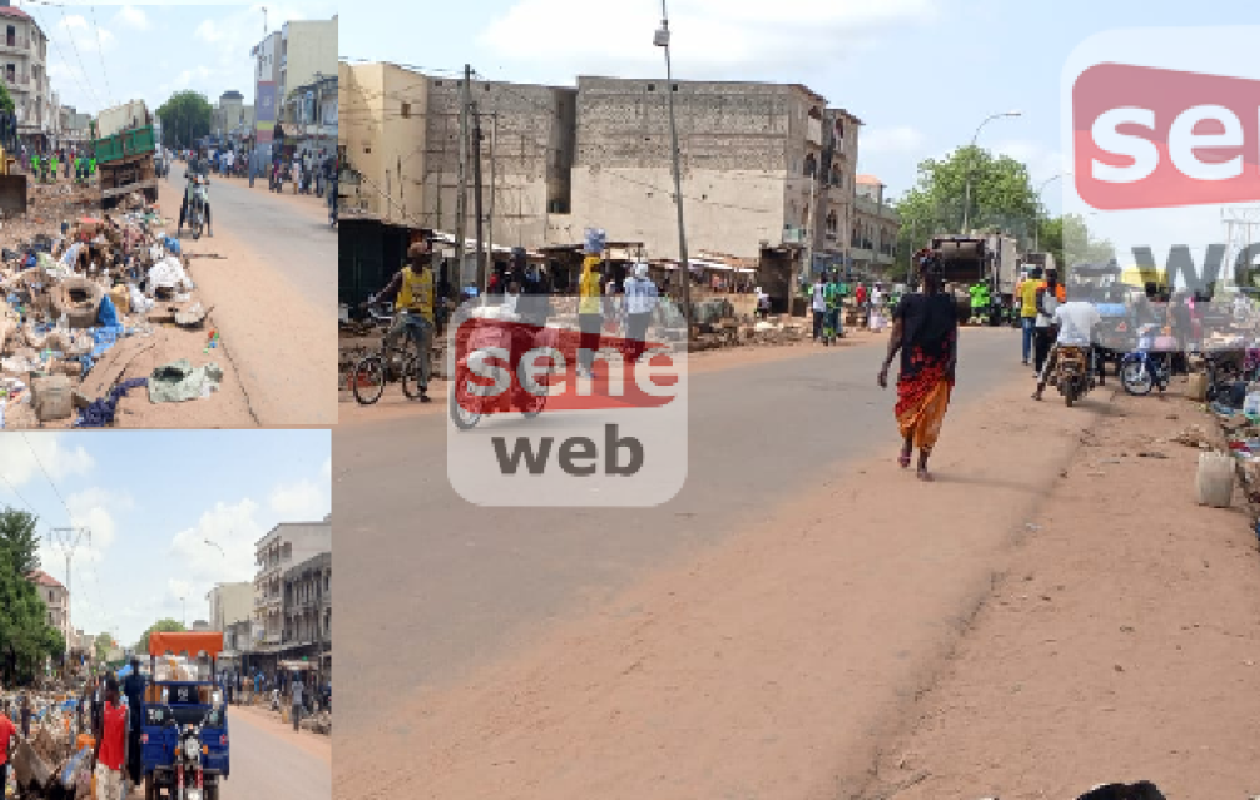
Après la libération des abords du marché et de la RN4 : Ce qu'attendent les commerçants des autorités municipales
The operation to relieve congestion on the RN4 and the area around the Bignona market took place on Saturday, October 25, without any problems. The affected traders have begun to move into the sites designated by the mayors of the municipalities of Bignona and Tenghory. This was welcomed by Prefect Mamadou Khouma, the project manager.
Following this, the mayor of Bignona, Bacary Diatta, stated: "We decided, by mutual agreement with the traders who occupied the RN4, to clear all the occupations. There were preliminary meetings preceding this activity to discuss the arrangements to be made so that everything could be done without causing damage. The traders, the occupiers had taken the initiative to clear, to remove their equipment and today, practically, there is nothing left because they themselves demolished their installations to facilitate the work."
Tenghory, resettlement area for 587 traders evicted from the RN4
These traders are now established in Tenghory. A discovery made possible by the administrative authorities who worked with the mayors of these two municipalities in the department.
According to the general secretary of traders, Yayakh Diédhiou, 587 traders have been relocated to the sites developed in the neighboring commune of Tenghory. "According to the census carried out in 2022, there were 300 traders. But currently, there are 587 beneficiaries of the Tenghory sites."
A loss of income for the commune of Bignona, but safety takes precedence
This eviction operation is not without consequences for the municipality of Bignona. The mayor claims that tax losses may result. However, for security reasons, it is worth it.
"We prioritize safety because, beyond the ministerial decree, there was the RN4 rehabilitation project that compensated all occupants. Today, there is a shortfall because these facilities allowed the municipality to generate resources through taxes. But for us, safety is more important. An accident could cause a catastrophe. But today, we have managed to convince the population, the occupants of the market, to be able to move around without problems," explained Bacary Diatta.
The traders are aware of this security aspect. Yayakh Diédhiou, their secretary general, acknowledges the problems raised by the authorities: "The market was so saturated that there wasn't even any security. But as of today, we clearly feel that what they were saying was true. Not only was there property, hygiene first, but also security. We are 20-25 meters from the road."
More support to ensure safety and health
All the relocated traders welcomed their new facilities. However, they wanted support. "We're happy to be here. We had huge problems when we were near the road, with the 'Jakartamen. And here, I personally feel comfortable," said this trader. As does her neighbor, who nevertheless points out the disorder in the stall setup. "We're happy to come to this site, but there's one thing we deplore: the allocation of spaces wasn't well organized. They were supposed to put the vegetable sellers on one side, the second-hand clothes dealers on the other, and the sellers of phones and other items elsewhere, instead of mixing us up. And that could be a problem for customers too."
Another concern raised: the length of time the premises will be occupied. Mbaye Cissé insists that the site they occupy belongs to a third party and that the lease remains unclear to them. "The site is land that belongs to someone. And according to our information, we'll be staying for six, maybe eight months.
Mbaye Cissé suggested building a market: "We want a market. It's the only solution. It's through this trade that we hope to take care of our families."
Bintou Diédhiou made the same plea. "The Djiragone market does not provide a livelihood for the commune of Tenghory. That's why we are requesting a market to get out of all these difficulties. We have regained this site, but we are not completely reassured, because it is someone else's land. We will have a clear conscience when there is a market available to us," she pleaded.
The traders also requested increased security at the resettlement site, with the provision of electricity. "If only we could have enough electricity for security, and why not for the safety of the goods? We also need toilets," said Yayakh Diédhiou, secretary general of the Traders' Association.
Commentaires (1)
Les principaux responsables des occupations des trottoirs et autres sont les maires qui pour faire des recettes acceptent l'installation anarchique, transforment la ville à un parc de vente de véhicules d'occasion. Ces espaces ne sont pas gratuits.
L'état a engagé des moyens pour nettoyer les villes. les maires ont l'obligation de maintenir cet état de fait. Ceux et celle qui n'arrivent pas à laisser les lieux publics libre des encombrements doivent être relevés pour mettre en place si nécessaire des délégations spéciales. Les revenus des taxes sont rarement investis dans le bien être des populations.
Participer à la Discussion